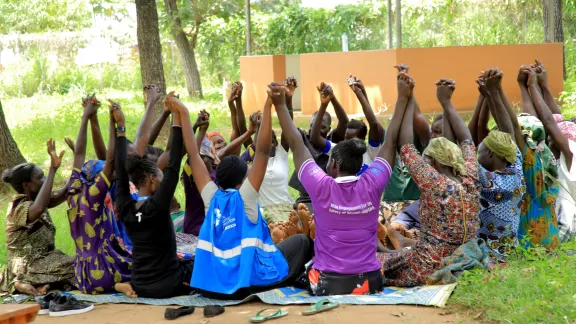In the midst of escaping conflict, navigating uncertainty, and coping with the absence of familiar social networks during emergencies, the mental well-being of refugees is frequently overlooked. LWF provides support to host communities and refugees experiencing distress to help them cope with trauma and its effects.

A mental health therapy session in Adjumani refugee settlement, Uganda.
Prioritizing mental health for refugees in Uganda
(LWI) - “My friends call me a doctor,” says Joan (name changed). The 22-year-old South Sudan refugee is a peer educator in the Palabek refugee settlement in Uganda. She helps other young adults in the settlement deal with trauma and mental health issues and advises on family issues and sexual reproductive health rights. She is part of a program by The Lutheran World Federation (LWF) to improve the mental health of young refugees, who find it difficult to confide in older members of the community.
On World Mental Health Day, the LWF Uganda country program published the findings of a mental health assessment in four of the largest Ugandan refugee settlements. The Lutheran World Federation (LWF) 2023 Mental Health and Psychosocial Services (MHPSS) report contains findings from the refugee settlements in the north and west of the country. Palorinya, Adjumani, Palabek, Rwamwanja, and Kyangwali settlements are home to more than 40% of Uganda’s 1.5 million refugee population.
Traumatic experiences after fleeing conflict
Mental health is a serious concern in many refugee camps and settlements. “Refugees often spend years, if not decades, in host countries. Their successful integration into the host society depends on their mental well-being,” says Adriana Franco Chitanana, LWF Country Representative in Uganda. “When social safety nets have unraveled, the psychological toll on the refugees can be severe.”
Joan, the young peer educator, has experienced terrible things herself. “Five years ago, I was married and pregnant when the rebels broke into our house at night, “she says. The armed men assaulted the young woman and killed her husband and brother. Later in the refugee settlement, Joan’s trauma manifested as depression.
Stigma and discrimination
In other cases, stress leads to violence. Many refugees come from conflict areas, Franco Chitanana says. “Traumatized individuals are prone to perpetuate violence, unaddressed mental health needs can hinder their ability to adapt, find employment, and contribute positively to their new communities,” the LWF Country Representative cites the report. “Cases of child neglect, alcoholism, and domestic abuse emerge.” Stigma and discrimination against persons with mental illness prevent people from seeking help.
According to the LWF assessment, caretakers of persons with mental illnesses generally seek help from traditional healers before taking their patients to hospitals; this often worsens mental disorders. “In South Sudan, we don’t grieve when we lose our loved ones; all you have to do is drink, and everything will be okay. You will forget,” says Lima Albino, a refugee from South Sudan. “Before the LWF therapy sessions, I used to hear women in the neighborhood crying at night due to their husbands’ alcohol-induced violence.”
Refugees are not helpless; they have agency and capacities to cope with adversities. – Adriana FRANCO CHITANANA, LWF Country Representative in Uganda
Inherent resources
LWF integrates mental health and psychosocial support across different sectors, including health, education, livelihoods, and more. Various projects aim to improve access to resources and safety for vulnerable individuals and communities. Much of this work builds on inherent community resources.
“Refugees are not helpless; they have agency and capacities to cope with adversities,” Franco Chitanana finds. In the wake of an emergency, community members themselves are always the first to respond. LWF addresses the complex psychosocial consequences of displacement and war trauma by harnessing their knowledge and aptitudes.
For Joan, the young woman from South Sudan, the peer education program was an essential step in her recovery. She could talk about what had happened to her and her family for the first time among her peers. Today, she says that being able to help others and sharing her experience made her feel stronger.
“Supporting refugees’ mental well-being can contribute to social cohesion and conflict resolution. As we celebrate World Mental Health Day, let’s prioritize mental health services for refugees in Uganda as part of a fundamental humanitarian obligation and to uphold their basic human rights”, Franco Chitanana concludes.


